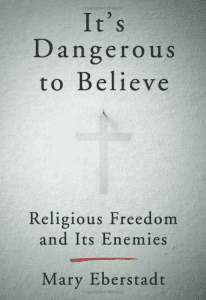Jason Micheli is the author of Cancer is Funny: Keeping Faith in Stage Serious Chemo. He’s a United Methodist in Alexandria, Va, blogs at www.tamedcynic.org, and hosts the Crackers and Grape Juice Podcast.
How Resident Aliens Live: Or, the Fitch Option
David Fitch’s Faithful Presence: Seven Disciplines that Shape the Church for Mission
On Ash Wednesday I suffered my monthly battery of labs and oncological consultation in advance of my day of maintenance chemo. During the consult, after feeling me up for lumps and red flags, my doctor flipped over a baby blue hued box of latex gloves and illustrated the standard deviation of years until relapse for my particular flavor of incurable cancer. I wrote a book called Cancer is Funny but it didn’t feel very funny looking at the bell curve of the time I’ve likely got until I make good on the promise that begins every Lenten season: ‘To dust you shall return.”
Leaving my oncologist’s office, I drove to the hospital to visit a parishioner. He’s about my age with a boy about my boy’s age. He got cancer a bit before I did. He thought he was in the clear and now it doesn’t look like it will end well. The palliative care doctor was speaking with him when I stepped through the clear, sliding ICU door. After the doctor left our first bits of conversation were interrupted by a social worker bringing with her dissonant grin a workbook, a fill-in-the-blank sort that he can use to insure that his boy knows who his dad was. We were interrupted again only moments after she left by the chaplain, dressed like an old school undertaker, offering ashes to us without explanation. It was easier for both of us to nod our heads and receive the gritty, oily shadow of a cross. “Remember,” he whispered, “to dust you came and to dust you shall return.”
As if the truth that none of us is getting out of life alive wasn’t already palpably felt between us.
The chaplain stepped over the tubes draped off the bed and left as quickly as he’d come. I sat next to the bed. I know from both from my training as a pastor and my experience as a patient, my job was neither to fix his feelings of despair nor to protect God from them. It certainly wasn’t to dump on to him the baggage I’d brought from my doctor’s office.
My job, I knew, as both a Christian and a clergyman, wasn’t to do anything for him, to bring to him my preconceived agenda but, simply, to be with him.
I listened. I touched and embraced him. I met his eyes and accepted the tears welling in my own. Mostly, I sat and kept the silence as though we were adoring the host.
I was present to him, with him, buoyed in the confidence that in this discipline of being present with him, naked and afraid- certainly one of whom Jesus calls the least among us, Christ was with us too, present in an almost tangible way that augers a permanent presence God will perfect in the fullness of time.
Here’s a question for the clergy types out there and, even, for ordinary non-pensioned Christians:
The confidence I have in the practice of being present in a hospital room, the trust I have that through the practice of presence Christ is present, why does it not extend to the other disciplines Jesus has given us?
Why is it that in the hospital room I’m content to be present, faithfully, and trust Jesus to show, yet everywhere else in my ministry I run (until I drop) on the unexamined assumption that it’s up to me to change my parishioners’ lives and then, with them, to change the world?
I trust Jesus not to be AWOL in the cancer ward but otherwise I typically operate as if God is the object of a curriculum program (for which I’m always scrambling to find the latest, shiniest product in the Cokesbury catalog) rather than the active agent in the world who calls us to participate with him and to do so not through the latest thematic teaching series but through the concrete practices he gave to us. It’s an assumption that in trying to conform people to Christ leaves them consumers instead and leaves me exhausted.
Taking his title from the coda of James Davidson Hunter’s significant book To Change the World, in Faithful Presence David Fitch unpacks the communal Christian disciplines by which God changes the world.
The grammar of that sentence is key to understanding Fitch’s work and how it connects with his preceding book Prodigal Christianity.
Whereas Fitch worries that James Davidson Hunter’s faithful presence proposal too easily becomes a prescription for individuals embodying the faith in the hopes of transforming culture, thereby underwriting the privatization and loneliness of the culture, Fitch notes how Hunter also misses, as perhaps a sociologist must, that we are not the active agents of mission.
In Faithful Presence, Fitch makes explicit that God is the subject of Christian speech; mission and transformation- they’re what God does.
Faithful presence then names a set of practices of the community but, more foundational, it names a participation in what the Living God is doing antecedent to us. Continuing the premise of Prodigal Christianity, where God the Son forsakes his inheritance to venture out into the Far Country that we call the sinful world in order to return all that belongs to the Father back to the Father, Fitch exposes the anthropological assumptions lurking behind how we conceive of the practices of the Church. They are not our means to God, for, in good Barthian fashion, scripture does not narrate our journey to God but God’s relentless journey to us. Nor do the practices simply equip us to engage in mission as though the mission was our mission. Rather the practices of the Church are the means God in Christ has given to us to locate God at work in the world and to join with God in what God is doing in the world. As Fitch writes, the practice of faithful presence is only intelligible because “God is present in the world and God uses a People faithful to his presence to make himself concrete.” God’s presence in the world, Fitch adds, cannot be apprehended generally or without mediation.
Only God can reveal God.
Therefore, we require the disciplines Jesus gave us.
Fitch’s emphasis on the disciplines echoes a bit with James KA Smith’s You Are What You Love. in that both authors lament the degree to which God in the Enlightenment got relegated to an idea or a belief in the individual’s head. Smith attempts a recovery of the practices of the faith because our formation comes through habituation not information. While Fitch would no doubt concur with Smith about the Enlightenment’s reductionism of discipleship to belief, the practices for Fitch are not merely habits to form us in our faith. They are the promised locations in which Christ is present with us and through which Christ changes the world. As Fitch notes, the Great Commission itself not only promises that Christ will be present to his people (“I am with you always”) the charge to make disciples of all nations assumes disciplines by which will be present to form disciples. The disciplines, as Fitch identifies them, bear resonances with the Catholic sacraments:
The Discipline of the Lord’s Table
The Discipline of Reconciliation
The Discipline of Proclaiming the Gospel
The Discipline of Being with the ‘Least of These’
The Discipline of Being with Children
The Discipline of the Fivefold Gifting
The Discipline of Kingdom Prayer
If Faithful Presence stopped there it would be a helpful theological corrective to how we treat the disciplines, reminding us they’re vessels of God’s activity not our mediums to God, but it would not enliven Christian imagination to broaden what we mean by engaging in God’s mission.
The unique contribution Fitch makes in Faithful Presence is arguing that each of these disciplines given to us by Christ have three interrelated and complimentary manifestations in the social spaces of our lives.
Precisely because God is the active agent of mission, on the move in the world, these disciplines should likewise force us to be on the move in a dynamic that avoids the familiar Sunday to Monday, in here-out there connection that bedevils Christians. Fitch denotes these spaces by illustrating three circles: a closed circle. a dotted circle, and a semi-circle. The closed circles represents the social space of the church. The dotted circle is an extension of the church, our friends and neighbors; like the closed circle, committed Christians still comprise the dotted circle but the dots show how this social space makes room for strangers and seekers too. The semi-circle meanwhile is what we might refer to as a third space where Christians go into the world, into their community, as a guest.
In the case of the Eucharist, for example, the closed circle is obviously the celebration of the sacrament during gathered worship. Because God is on the move, the presence of Christ in the sacramental table extends into the community so that, in the dotted circle, a Christian leader hosts friends, committed and curious, at a table in their home and, over food and wine, they pray together, make themselves vulnerable to one another, discern God’s word, and submit aspects of their lives to the lordship of Christ. Finally, in the semi-circle, the mutual vulnerability at table gets extended out into the community where the Christian is not the host but risks being the guest of neighbors and unbelievers. As Christ is present at the ornate lacquered table in the sanctuary, Christ is present at this ‘profane’ table too, at work to nurture all that is the Father’s back to him.
I taught a PDF version of Faithful Presence to a group of local pastors at Wesley Seminary last summer for a two week course on mission.
The way Fitch extends the disciplines across these social spaces to show how and where the church can engage in God’s mission shifted the entire paradigm for their thinking.
In my own United Methodist tradition, ‘mission’ has gotten redefined as good (social justice) work someone else does, be it the denominational apparatus or the credentialed missionaries funded by it. Not only does this demote our denominational connection to a funding relationship, it disempowers local churches from discerning where God is at work in their local communities. Rather than three increasingly widened circles through which we extend presence, it assumes only two closed circles, the local church celebrating the sacraments and the global church doing good works. Its an arrangement that encourages maintenance mode ministry, which in a post-Christian culture necessarily leads to exhaustion. What’s more, it leaves pastors ill-equipped to extend the disciplines into their homes and community.
Every pair of eyes in the classroom popped open as they begin to revision their ministry, asking what it would be like for them to gather neighbors and community members around the dotted circle of their table, trusting that Christ will be there to call people over time into submission to him. The possibilities multiplied for them as they applied these three social spaces to the other disciplines in Fitch’s book. And, it should be noted, these local pastors all served small congregations. The conventional way of construing mission had only disempowered and discouraged them that churches their size could not meaningfully do mission. They could neither send lots of money to the denomination nor could they execute expensive, volunteer-heavy mission projects for the less fortunate.
In the same way the limitations of a small canvas can provoke the most creative art, Fitch’s explication of these particular disciplines extended across the ordinary social spaces of their lives exploded imaginative possibilities for their ministries.
As much as Christ is present in and through a funded missionary in Cambodia, they realized, Christ is present when they sit with someone like me in the hospital room. If God is the active agent of mission and not us, then it’s silly to distinguish between ‘real’ mission and ordinary practices like breaking bread and forgiving sin.
As a preacher, I think Faithful Presence is worth the read just for the theological framework. Our Christian speech needs reminding always that God is the agent not us.
As a pastor, I believe Faithful Presence is exactly the sort of manual that maintenance modeled mainline churches need in order to learn how to engage with Christ in their post-Christian contexts. In many ways, Faithful Presence is the handbook for how resident aliens live. It offers the praxis Stanley Hauerwas’ sequel to Resident Aliens never quite managed to flesh out.
As a closet Anabaptist, however, I’m left with a question.
I’d like to see Fitch engage how Faithful Presence interacts with John Nugent’s equally good book Endangered Gospel: How Fixing the World is Killing the Church. While agreeing with Fitch that God is prodigally at work in the world, my reading of Nugent makes me wonder if Fitch has made the Church too instrumental and not a good and an end in and of itself; that is, is the Church the means through which God is changing the world or, as Nugent argues, is the Church the change, the better place, God has already made in the world?
While I hope to see future engagement between Fitch’s and Nugent’s complementary work, I suspect Fitch’s Faithful Presence is a needed companion to another book in everyone’s queue at present, Rod Dreher’s The Benedict Option.
Dreher sees Western culture as lost and, in the wake of the Obergefell decision, antithetical to it. In the light of this development, Dreher recommends Christians imitate the witness of St. Benedict of Nursia, retreating into disciplined enclaves of like-minded, like-valued Christians in order to weather a new dark age.
Despite my sympathies for Dreher’s proposal, I think the Benedict Option may be a curious option to commend to Christians in this moment because, in fact, St. Benedict was not retreating from culture. Rather, he was also safeguarding the best contributions of elite and secular culture during the dark ages. Benedict helped change the world not simply by retreating from it, as Dreher suggests, but by preserving the best contributions of culture-makers. St. Benedict, then, corroborates James Davidson Hunter’s thesis that culture is changed only from the top down, from the culture-makers outward to the culture-consumers.
I believe Fitch’s Faithful Presence offers a middle way between the concerns of Rod Dreher’s Benedict Option about Christians now living as strangers in a strange land, on the one hand, and Hunter’s argument, on the other, about how cultures undergo transformation through its culture makers. In particular, Fitch’s 3 Circles of faithful presence provide Christians with a more balanced rhythm of gathering in disciplined, intentional community with other Christians, for the sort of formation and preservation Dreher seeks, but also venturing out into networks of friendships and neighborhoods to join in what God is already doing among them.
What Fitch helps us remember, even Dreher, is that discipleship is not only about practices, which can be preserved and practiced apart from culture, it is as much about participation too.
With God.
It all comes back to God’s agency.
The agency of God is perhaps the fatal flaw in Dreher’s book for he forgets, or neglects to make clear, that God is active in the world (a world Dreher would characterize as ‘lost’ to the Church) apart from the Church and God is waiting for the Church, who are God’s sent People, to join him in his work.
Because so many now are discussing the latter book, I cannot recommend the former with heartier enthusiasm.
 Bates tackles new creation head on, beginning with a story of his preaching to an unsuspecting small church far more accustomed to soul-to-heaven thinking. He offers this pastoral, wise observation:
Bates tackles new creation head on, beginning with a story of his preaching to an unsuspecting small church far more accustomed to soul-to-heaven thinking. He offers this pastoral, wise observation:







 Practice of Science. It is relatively easy to see where the practice of chemistry and physics; geology and agriculture; genetics and embryology along with many other disciplines and subdisciplines can be approached through the lens of methodological naturalism. We look for and confine ourselves to the study of the interactions between atoms and molecules, even subatomic particles, the interaction of light and gravity with matter, and the laws that describe these interactions.
Practice of Science. It is relatively easy to see where the practice of chemistry and physics; geology and agriculture; genetics and embryology along with many other disciplines and subdisciplines can be approached through the lens of methodological naturalism. We look for and confine ourselves to the study of the interactions between atoms and molecules, even subatomic particles, the interaction of light and gravity with matter, and the laws that describe these interactions. When is methodological naturalism troublesome? Here I leave Jim’s chapter and give my own view. Methodological naturalism is troublesome when we step away from the impersonal (chemistry, physics, …) and move to the personal. If there is a God who interacts with his creation methodological naturalism will give the wrong result in these instances.
When is methodological naturalism troublesome? Here I leave Jim’s chapter and give my own view. Methodological naturalism is troublesome when we step away from the impersonal (chemistry, physics, …) and move to the personal. If there is a God who interacts with his creation methodological naturalism will give the wrong result in these instances.




